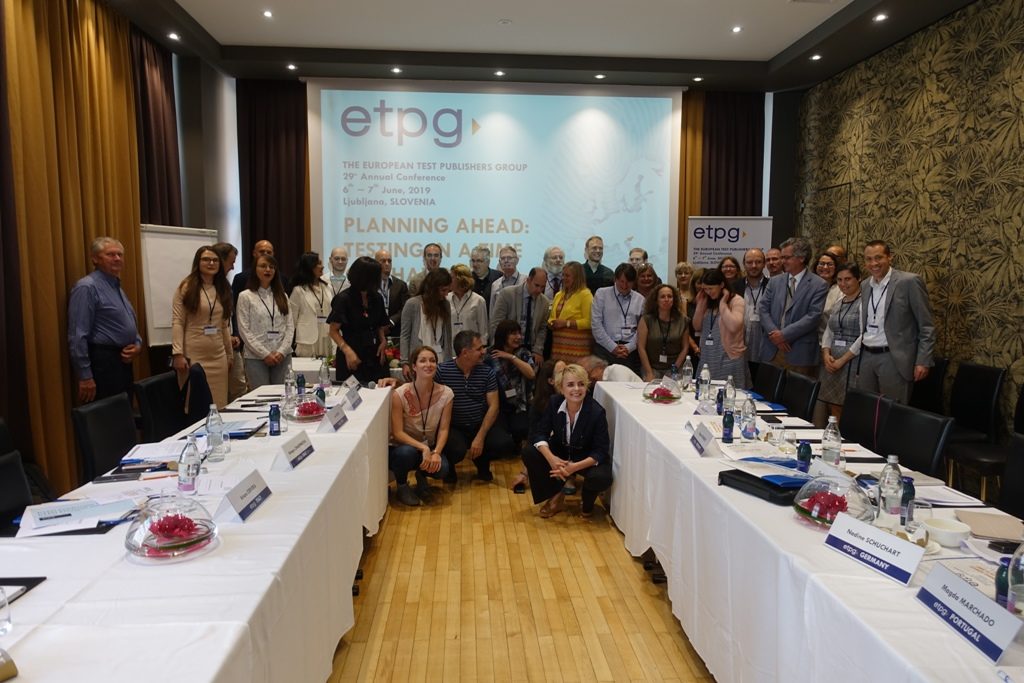
Our 29th Annual Conference was held at the historic Hotel Slon in Ljubljana, Slovenia. It was hosted by Dusica Boben and her team at Center za Psihodiagnosticna Sredstva D.O.O. 40 delegates and five speakers attended.
The agenda reflected issues which are affecting and can be influenced by psychology in general and psychometrics in particular: rapid developments in technology and increasing links between psychology and technology: changes in European demographics; the evolution of academic and applied psychologies; global developments from global warming and environmental degradation to mass migration.
Brief summaries of presentations by our guest speakers are:
Dr Jure Zabkar: Artificial Intelligence in Clinical Practice; The AI Lab at the Faculty of Computer and Information Science, University of Ljubljana, has a long track of research and applications in the clinical area, from prof. Bratko’s qualitative model of the heart (KARDIO) model to recent research into Dyslexia. After a short presentation of the AI Lab, the talk focused on the ongoing student project Dyslexia, aiming to detect the first signs of dyslexia among elementary school children.
Mag. David Gosar: Promises and Challenges of Big Data in Clinical Psychology: Tackling or Hope the Complexity of Mental Health using Machine Learning and Networks: Using supervised machine learning algorithms, researchers are currently using large datasets with known predictors and outcomes to learn complex rules by which patient outcomes can best predicted. But there are significant challenges for AI. The large amounts of data usually needed are rarely collected in the field of clinical psychology. Because of machine learning’s focus on prediction, less emphasis is placed on understanding the algorithms and constructs behind the predictions. The predictive power of biometric and other personal data used by machine learning algorithms also raises new ethical issues in the field of psychological assessment regarding standards of privacy.
Dr Maja Zupancic: Personality from Childhood through Emerging Adulthood: State-of-the-Art, Implications and Future Research Projects. Dr Zupancic focused on the trait approach and provided an insight into a common five-factor taxonomy of traits over the pre-adult years, which is based on an integration of developmental (i.e. temperament) and personality psychology tradition. She reviewed psychometrically sound measures to assess trait differences, particularly in children, as well as research findings on different types of developmental trait continuity and change over the first two decades of the lifespan. She presented the origins of trait differences, the processes underlying the elaboration of early emerging individual differences into emerging adulthood, and the ways through which personality traits may shape important developmental trajectories.
Dr Zvezdan Pirtosek: Consciousness in Humans and Beyond: what is it and can we measure it? The only thing we know for sure is that we are conscious. However, consciousness is graded over a lifetime, being high when healthy and adult but withering with advanced age, disease, drugs, alcohol… The question of consciousness and its demonstration & measurement has deep philosophical and academic importance; not only for consciousness in modern humans, but also for questions of how conscious experience emerged in evolution, its (non) existence in animals and possibly in AI robots along with the related moral, legal, personal rights. While the ‘easy’ problem of consciousness as defined by Chalmers may arguably be well addressed with various measures of cerebral activity (EEG, fMRI, PET) and explained with several neural systems (Llinas’ recurrent thalamo-cortical resonance, Graziano’s “attention schema” theory), measurements of the consciousness ‘beyond’ is more problematic. Recent work of the University of Milan group based on Tononi’s integration information theory offers an interesting and promising way to assess and measure consciousness in humans and beyond.
Dr Rachel Tribe: Refugees and Psychology: The accelerating Change
Dr Tribe looked at some of the major differences between an immigrant and a refugee and some of the implications that this may have for psychological practice including psychometric testing. She discussed narratives about migrants and refugees in their new countries andpossible implications for psychological well-being and employability. Services which concentrate only on an individuals’ refugee or migratory status may inadvertently minimise the experience of a service user and reduce an individual to a part of their life (as a migrant or refugee) rather than considering the whole lived experience of that person. This reductionist approach may also risk underestimating the strengths that an individual possesses. Idioms of distress, explanatory heath beliefs and presentation may be expressed differently across countries and cultures and this needs to be actively considered by psychologists and psychometricians.
Dragos Iliescu outlined The ITC Guidelines for the Large-Scale Assessment of Linguistically and Culturally Diverse Populations
In addition, the conference discussed possible new member applications; relations with external bodies such as EFPA, ITC and the ISO; a possible full day session for members on AI and robotics in testing.
